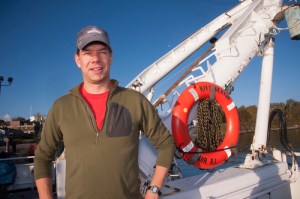 Andrew Steen, a research assistant professor in microbiology, has his feet back on dry land after spending a week at sea with thirteen other scientists.
Andrew Steen, a research assistant professor in microbiology, has his feet back on dry land after spending a week at sea with thirteen other scientists.
Steen was chosen to be part of the scientific crew of the research ship R/V Endeavor on a cruise that aims to train the next generation of seagoing scientists to become chief scientists.
“The training cruise and workshop are designed to help younger scientists like me understand all the roles of a chief scientist,” said Steen, who arrived at UT in 2012. “This involves planning the expedition, ensuring all equipment is on board, logistics, coordinating scientists’ space, and other details to ensure a successful cruise. This cruise gives us hands-on practice for the rest of our careers.”
In addition, the young scientists also carried out scientific research.
Steen continued research from the summer with students from a New Jersey high school. He is investigating how marine bacteria acquire their food.
“We know phytoplankton convert carbon dioxide into biomass. Marine bacteria eat that biomass, and convert most of it back to carbon dioxide,” said Steen. “What we don’t know is how that digestive process works. Bacteria (and people) digest their food using enzymes called peptidases to break down protein. I’m quantifying the range of different peptidases present in seawater, so we can get a better idea of what kinds of food marine bacteria like to eat.”
The research will help to explain the controls on the level of carbon dioxide in the atmosphere.
“If we want to be able to predict how the global carbon cycle will respond to climate change, we need to better understand how it works now. This work will help to explain the controls on carbon dioxide production in the ocean,” said Steen.
The cruise is funded by the National Science Foundation and the Office of Naval Research. The training program is coordinated by the University-National Oceanographic Laboratory System, based at the University of Rhode Island’s Narragansett Bay Campus, which schedules and deploys the nation’s fleet of nineteen research vessels.
Read a blog about the trip on the workshop’s website.
—
C O N T A C T :
Whitney Heins (865-974-5460, wheins@utk.edu)